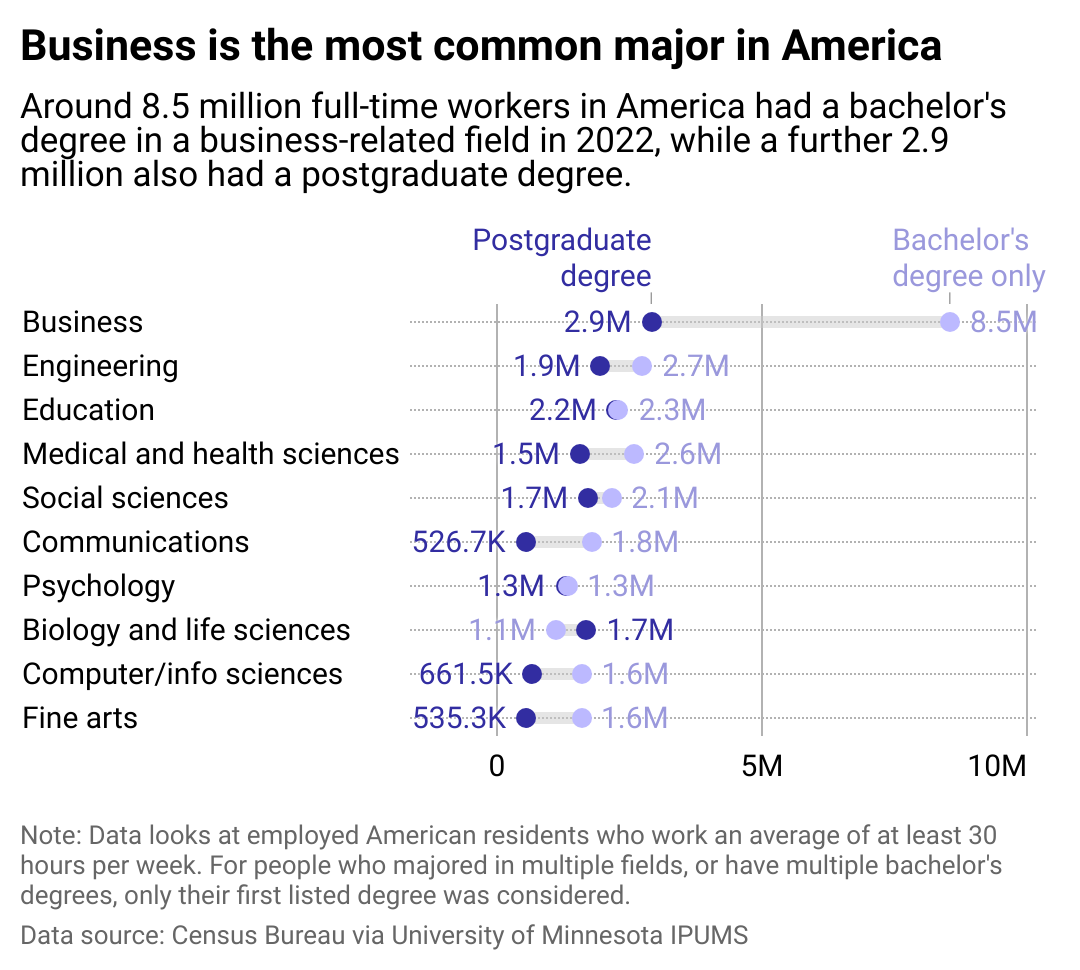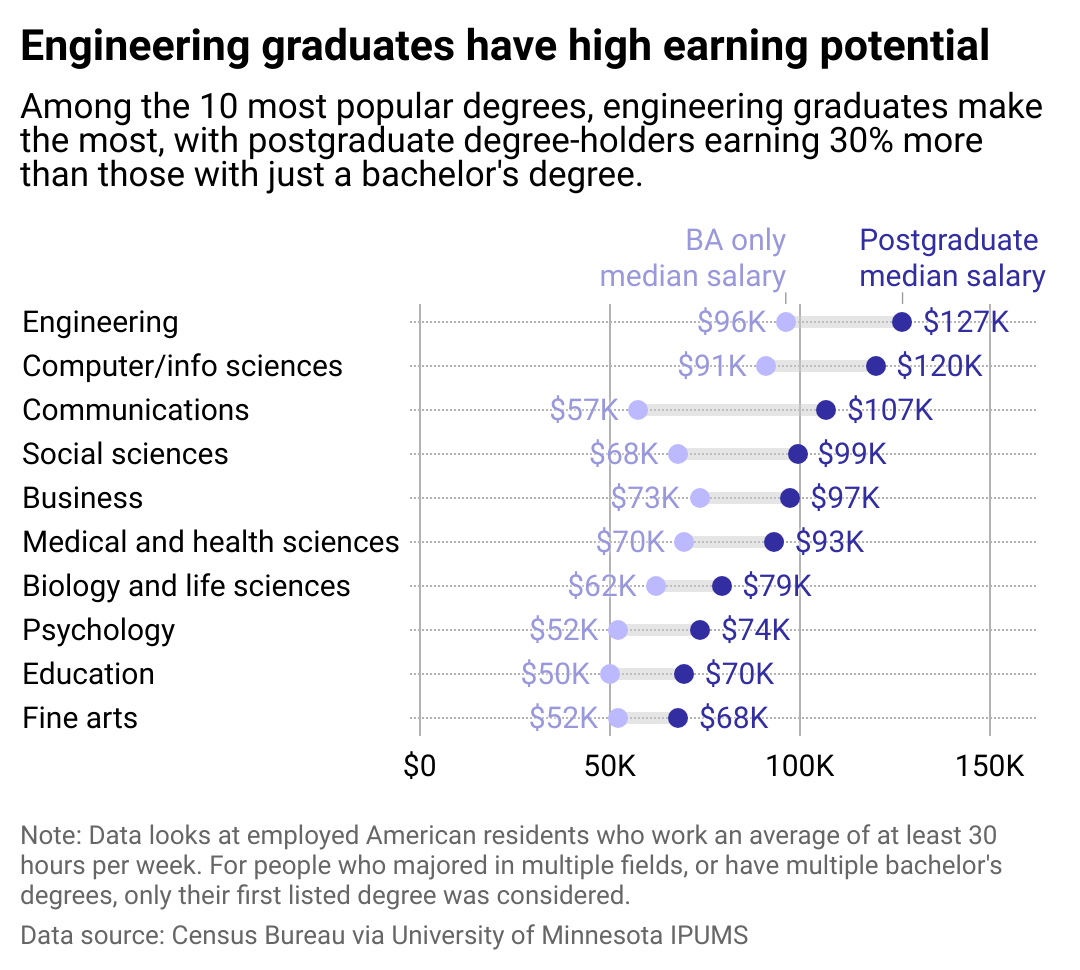Which common college majors have the highest earning potential?
Published 8:45 pm Thursday, May 9, 2024
Which common college majors have the highest earning potential?
More Americans than ever are earning diplomas, which boosts earnings and decreases their risk of unemployment. However, as tuition costs continue to rise, higher education is coming at a greater cost to many Americans.
Learner analyzed data from the Census Bureau via the University of Minnesota IPUMS to determine the most common college majors for American workers.
In 2022, among adults 25 and up, 37.5% had at least a bachelor’s degree, up from around 28% in 2009. The rise, in part, may be due to a shift in job requirements: Roles that once required just a high school education now call for a college degree. Americans holding bachelor’s degrees had an unemployment rate of just 2.2% last year, compared to 3.9% for those with only high school degrees, according to the Bureau of Labor Statistics.
New York Federal Reserve research published in 2019 found that college graduates had a substantial premium over workers with only high school degrees, earning about $30,000 a year more on average. They estimate that for students who complete their degrees, the return on investment for a college degree is around 14%.
![]()

Learner
What are the most common degrees?
Business is by far the most common undergraduate major. As of 2022, around 8.5 million adults working full-time had a bachelor’s degree in a business-related field, while 2.9 million of them also earned some kind of postgraduate degree in the field, such as a master’s degree in business or accounting.
Common jobs for business majors include accountants, who make a median income of $80,000 yearly; financial analysts, who make around $100,000; and market researchers, who take home about $75,000, per BLS data.
Engineering and education were the next most common fields for full-time workers, with around 4.5 million graduates each.
In most fields, bachelor’s degrees tend to be more common than postgraduate degrees, but life science is an exception to that rule.
In 2022, there were 1.7 million full-time American workers with both a life science undergraduate degree and at least some kind of postgraduate degree, but only 1.1 million workers with just a bachelor’s degree in the field.
Many research jobs require a postgraduate degree, and biology is a common major for doctors. Biochemists and biophysicists, who earn a median salary of $107,460 annually, can get entry-level jobs with a bachelor’s degree but tend to need an advanced degree as well.

Learner
Who earns the most?
Not surprisingly, workers with postgraduate degrees typically earn more than those with only bachelor’s degrees. The highest earners with a bachelor’s degree tend to be engineering and computer science majors, with median annual salaries of $96,000 and $91,000, respectively. By comparison, a postgraduate degree boosts their annual earnings to $127,000 and $120,000, respectively.
In some fields, there’s a significant difference in earnings between workers holding undergraduate and postgraduate degrees. Communications majors with an advanced degree earn a median salary of $107,000 a year, nearly double that of their peers holding just a bachelor’s degree.
In recent years, increased awareness about the burden of high-interest student loan debt has challenged the value of a college education. The average U.S. household with bachelor’s degree debt owes $29,100, while households with graduate school debt owe over double that amount, with an average of $77,300, according to a 2023 Nerdwallet study.
The New York Fed found that the return on investment for college graduates has fallen slightly in recent years due to increasing costs. The College Board found that four-year college costs amount to around $20,000 yearly at public schools with in-state tuition and $35,000 a year at private schools after accounting for financial aid.
For many prospective students, college can be an expensive proposition. In a shift from the last decade, some employers that once considered a four-year degree a vital requirement no longer do. And, in recent years, wages for many lower-paid jobs are catching up to office jobs that require a college education. However, for some, especially those with an academic aptitude, earning a degree can still make financial sense.
Story editing by Alizah Salario. Copy editing by Kristen Wegrzyn.
This story originally appeared on Learner and was produced and
distributed in partnership with Stacker Studio.






